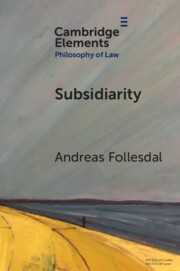Refine search
Actions for selected content:
2 results

Subsidiarity
-
- Published online:
- 20 February 2025
- Print publication:
- 20 February 2025
-
- Element
- Export citation
5 - The Challenge of Establishing Universal Principles
-
- Book:
- The Unruly Notion of Abuse of Rights
- Published online:
- 16 July 2020
- Print publication:
- 06 August 2020, pp 68-78
-
- Chapter
- Export citation
